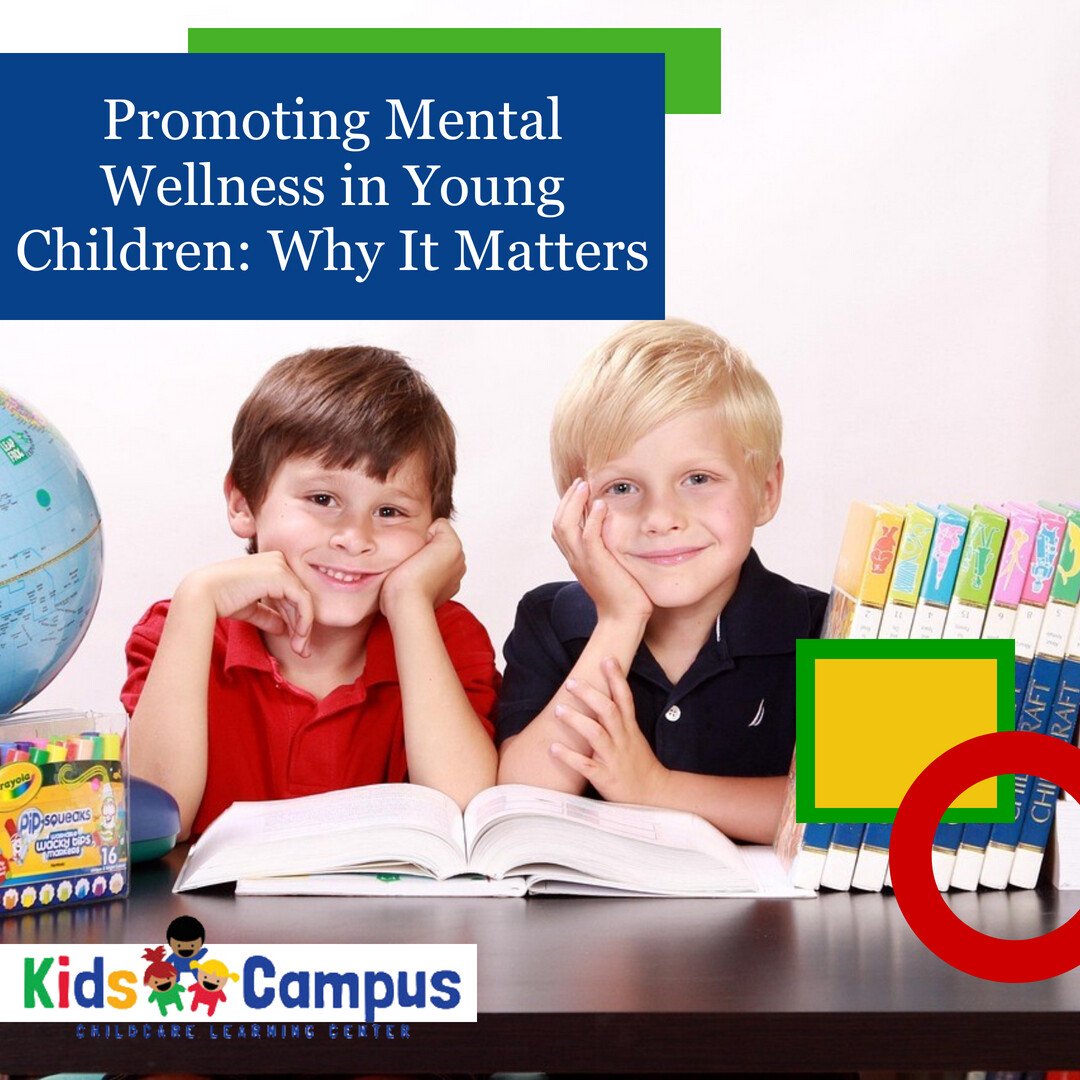Promoting Mental Wellness in Young Children: Why It Matters
In today’s fast-paced and increasingly complex world, promoting mental wellness in young children is more important than ever. Mental wellness is the foundation for a child’s emotional, social, and cognitive development. When nurtured early, it sets the stage for academic success, healthy relationships, and overall well-being throughout life.
At Kids Campus, our Early Childhood Learning Centers in Lynbrook and Valley Stream are deeply committed to supporting the mental and emotional health of every child in our care. Through intentional programming and compassionate guidance, we help young learners build resilience, self-awareness, and confidence from the very beginning.
Why Mental Wellness Matters in Early Childhood
Mental wellness in children refers to their ability to experience, express, and manage emotions, form close relationships, and explore and learn in a safe environment. According to the Centers for Disease Control and Prevention (CDC), nearly 1 in 5 children ages 3 to 17 (21%) have been diagnosed with a mental, emotional, or behavioral health condition.
While that statistic may sound alarming, it highlights the importance of early intervention and creating a strong support system in the early years. Children with good mental health are more likely to:
Develop secure attachments with caregivers and peers
Exhibit stronger problem-solving and coping skills
Communicate their needs and feelings effectively
Thrive academically and socially
Early Signs of Mental Wellness Concerns
Children may not always have the words to express what they're feeling. That’s why it’s essential for parents, teachers, and caregivers to look out for behavioral cues that may indicate a child needs extra emotional support. Some early signs to watch for include:
Frequent temper tantrums or emotional outbursts
Difficulty making or keeping friends
Excessive worry or fearfulness
Withdrawing from activities or people
Changes in eating or sleeping habits
If you're noticing these signs, consider speaking with your pediatrician or a child mental health professional. The American Academy of Pediatrics (AAP) offers helpful resources on understanding children's mental health and when to seek help.
How Kids Campus Supports Mental Wellness
At Kids Campus, we believe that mental wellness starts with a caring, consistent, and enriching environment. Our programs are intentionally designed to support the emotional well-being of each child through:
1. Routine and Structure
Predictable routines provide children with a sense of safety and control. Our daily schedules include structured activities, quiet time, and opportunities for unstructured play—all important for emotional regulation.
2. Social-Emotional Learning (SEL)
We incorporate SEL activities that teach children to recognize emotions, practice empathy, and build positive relationships. Simple tools like emotion cards, group sharing time, and role-playing help children develop critical social skills.
3. Positive Reinforcement
Our educators use affirming language and praise to build self-esteem. Rather than focusing solely on behavior correction, we guide children to understand their emotions and develop self-control.
4. Safe Spaces for Expression
Children need spaces where they feel safe to express themselves without judgment. In our classrooms, we offer calming corners and encourage open conversations about feelings. Learn more about our philosophy and approach to early childhood development.
How Parents Can Promote Mental Wellness at Home
Mental wellness isn’t just something we foster in the classroom—it begins at home. Here are a few simple ways parents and caregivers can support their child’s emotional health:
1. Encourage Open Communication
Make it a habit to ask your child how they're feeling each day. Use age-appropriate language to help them label and express their emotions.
2. Model Healthy Emotional Habits
Children learn from what they see. Demonstrating healthy ways to manage stress—like deep breathing, problem-solving, or asking for help—teaches your child valuable coping skills.
3. Prioritize Play and Rest
Free play supports creativity and emotional expression. Likewise, ensuring your child gets adequate sleep and downtime is essential for managing stress.
4. Read Books About Emotions
Reading together is a wonderful opportunity to talk about feelings. Books like The Color Monster or When Sophie Gets Angry are great starting points. Check out this recommended reading list from Zero to Three for more ideas.
Building a Mental Wellness Routine
Consistency is key. Here’s a simple mental wellness routine you can start today:
Morning: Practice a few deep breaths together before heading out for the day.
After school: Create a quiet time zone for unwinding and reflection.
Evening: Share three things that made you feel happy, proud, or grateful.
By making these practices part of your daily life, you help your child internalize healthy emotional habits.
When to Seek Help
Even with a nurturing environment, some children may need additional support. If you have concerns, reach out to a licensed child therapist or school counselor. Early support can make a lifelong difference.
At Kids Campus, we partner with families to provide referrals, resources, and strategies tailored to each child’s needs. If you're concerned about your child’s emotional development, don’t hesitate to contact us through our contact page.
A Community That Cares
Promoting mental wellness in young children is a shared responsibility—and one that benefits everyone. At Kids Campus, we’re more than educators; we’re partners in your child’s growth. By nurturing emotional intelligence and providing a loving environment, we help children build the resilience they need to thrive in school and in life.
To learn more about our programs in Lynbrook and Valley Stream, visit our Programs page and discover how we support whole-child development from the inside out.

